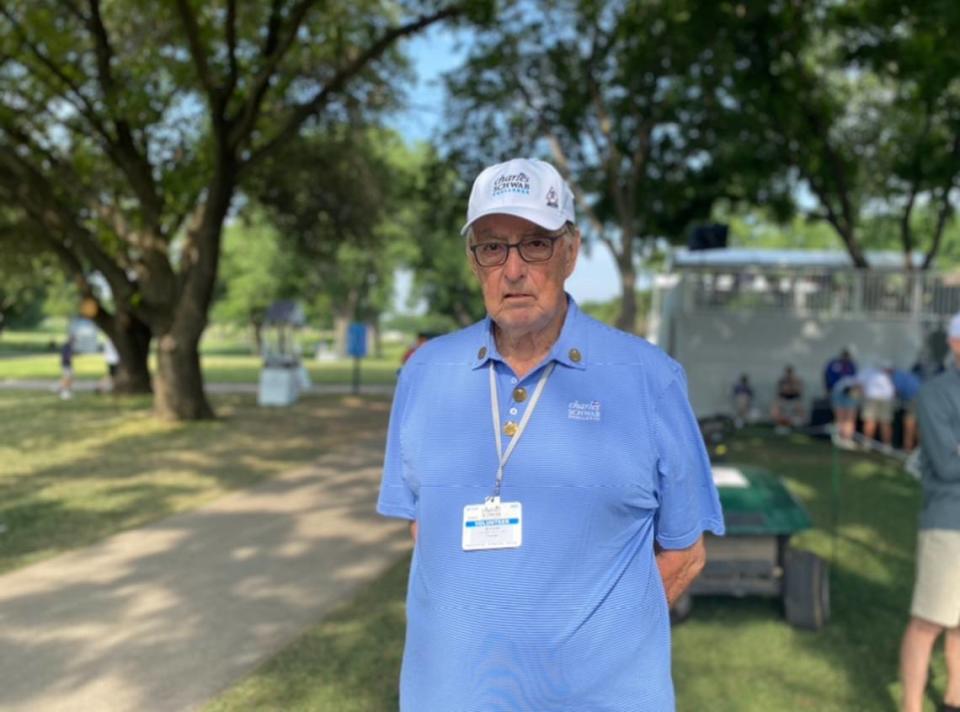Meet the man who’s volunteered for over 50 years at the Charles Schwab Challenge
In the volunteer headquarters at the Charles Schwab Challenge there sits a board of names that towers over the room.
At the very top, there sits four names and one of them is Bud Smith. How did he get his name up there? By volunteering at the event for the 50th time.
The 80-year-old hasn’t missed a chance to volunteer since he started in 1972. His reasoning for constantly coming back is simple.
“I play golf and I love golf,” Smith said. “I had the opportunity to come out here and work with them, that was a lot of fun for me to be around the pros and different events.”
Opportunity of a lifetime
It would be an understatement to say Smith is well-traveled. He grew up in Springfield, Mo., graduating from Drury College in his hometown. He completed his master’s degree at the University of Arkansas and then ended up in Chicago for a few years with his wife.
His job at the time then transferred him to St. Louis for three years and then he and his family finally arrived in the Dallas-Fort Worth area in 1972. That same year, his co-worker presented with an opportunity that ended up changing his life.
“I was working with this guy named Lou Cutter and at that time he said ‘Hey, I work at the Colonial in communications,’” Smith said. “I said, ‘Well what’s that exactly mean?’ ”
Cutter sold Smith on the idea of basically being a human scoreboard. Smith’s initial job was to be in a group of three that walked with golfers and their caddies along the course relaying information from the course to the scorekeepers.
“We had phones, at the end of every hole we would call communications and say, ‘Oh, Watson had a four, Holmes had a three,’” Smith said. “They would update the wooden scoreboards and show the things we relayed. Also if there was rain coming, they would tell us all that too.”
For many years Smith would serve as a valuable resource for golfers and the course alike though his role and duties began to change as the years began to pass.
Evolution
As technology evolved, so did Smith’s jobs. After a lengthy time of being apart of the trio that would follow golfers and relay information, the Colonial went to a new system; lasers.
Smith officially became a location-based operator with newer duties.
“They decided we would have lasers on every hole,” Smith said. “We would be about six to eight feet up and when the ball hit on the green we would take the laser and put it right on the ball. It would tell us a precise location and all we had to do was press a button and it would send to the computer.”
That was the method Smith became accustomed to for the decade or so, until the Colonial changed to its current method. At hole No. 8 Smith sits under a tree with another volunteer sitting next to him.
There’s no laser or big walkie talkie this time, just a modest tablet in his hands.
“When the ball hits the green, every time it hits it’ll roughly show where it is on the tablet,” Smith said. “There are cameras, the cameras show where the ball is and relays it to the tablet. We’ll hit a button that says ‘Yes’ if it’s right.”
Whether it be new technology, the heat or just life in general, Smith endured it all to always make sure he was there when organizers needed him. He’s retired now, but when he was working Smith even made sure to come to an agreement with his job that on these four days out of the year, he needed to be here.
And for that dedication, Smith was honored on Friday during lunch for his service and commitment to the tournament.
“I was delighted, it was a wonderful,” Smith said. “This opportunity to come out here and give myself to these people has been a blessing.”



